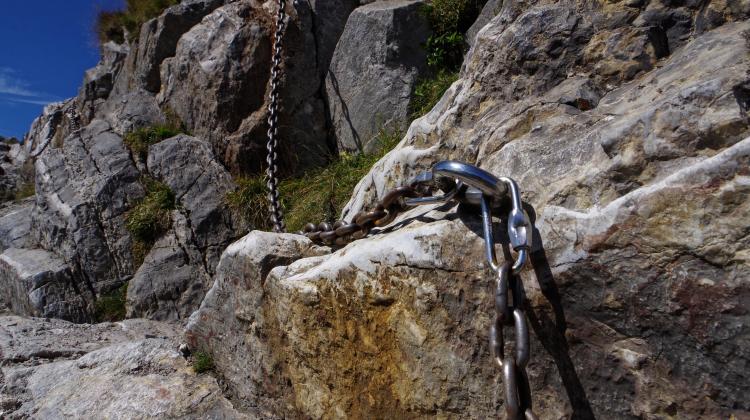We know the finalists of Science Populariser 2017
 Photo: Fotolia
Photo: Fotolia
We now know the group of finalists of Science Populariser 2017. From this group, the jury will select the winners, whose names will be announced in mid-January, during the competition gala in Warsaw.
62 candidates entered this year\'s 13th edition of the Science Populariser competition. In the first stage of voting, the members of the jury selected 23 finalists, nominating the best in each of the competition categories: Scientist, Institution, Media (5 finalists in each), Animator and Team (4 finalists in each).
Winners will be announced during the competition gala in mid-January at the Copernicus Science Centre in Warsaw. The jury will announce the names of the best individual popularisers, as well as the names of the best teams, institutions and media that promote science. Above all, the jury will name the Grand Prize winner, who will receive the title of Science Populariser 2017. Like every year, the editorial staff of PAP - Science and Scholarship in Poland will additionally grant special Tomasz Trzciński Award for the benchmark information policy.
The winners of the title of Science Populariser and the statuette of this year\'s edition of the Science Populariser competition will be selected by the jury, whose members are: Prof. Michał Kleiber (chairman) - one of the initiators of the competition, a longtime president of the Polish Academy of Sciences, former Minister of Science and Information Technology; Prof. Magdalena Fikus - promoter of science, co-organizer of the Warsaw Science Festival; Robert Firmhofer - director of the Copernicus Science Centre, ed. Krzysztof Michalski - science journalist of Polish Radio, Dr. Robert Mysłajek from the University of Warsaw (promoter of natural sciences), as well as representatives of the Ministry of Science and Higher Education and PAP - Science and in Poland.
In 2017, the first stage of the evaluation of candidates was conducted by a jury composed of winners and special award laureates in the earlier editions of the competition: Dr. Robert Mysłajek from the University of Warsaw, Dr. Piotr Sułkowski from the University of Warsaw (known from the project "Ask the Physicist"), Prof. Wojciech Dindorf - retired teacher who has been promoting science for over 65 years, Dr. Magdalena Osial from the University of Warsaw (author of the project "Workshop of Scientists, the University of All Ages"), Michał Szydłowski (who makes scientific presentations for schools and scientific festivals as Mr. Cork), Dr Ireneusz Kaługa from the EcoLogical Group, Prof. Przemysław Wojtaszek from Adam Mickiewicz University in Poznań (initiator and main organizer of the national campaign "Night of the Biologists").
They selected the finalists from among the candidates. How do they view the science popularisation activity of candidates? Professor Przemysław Wojtaszek emphasised that "the choice was not easy, because many candidates are excellent". "Very interesting applications and a difficult choice" - confirmed Dr. Mysłajek.
Ireneusz Kaługa emphasised the high level of the candidates, professional presentation of achievements and inspirational projects carried out by the finalists. "Each of the five competition categories is literally packed with exceptional people who are behind incredibly ingenious initiatives. For the majority of finalists, day-to-day activities have become a way of life and a passion that screams out for reward. You are all winners!" - he said.
Commenting on the entries, Dr. Piotr Sułkowski emphasised that he was very happy with the variety of ideas and involvement of many people who want to do something for others. "Small, grass-roots initiatives, not necessarily from big centres, deserve special recognition and should be supported in every possible way" - he said.
According to Michał Szydłowski (Mr. Cork), the difficult task in individual categories was to compare those candidates whose age was little more than the years others had spent promoting science. "Some entries were surprising not only in terms of description of the activity, but also in terms of the method of promotion usually not associated with the particular field of study. The common feature of all candidatures was their online activity" - he emphasised.
"To measure without measurements is a physical impossibility. Without measurements, you only very subjectively estimate. I looked at all the pictures candidates had sent and read everything that was written. I got to know all candidates really well" - said Prof. Dindorf, who described rejecting candidates as a "sad duty" resembling "performing an execution".
The list of this year\'s finalists:
Category: Scientist
Katarzyna Książek
Joanna Stojer-Polańska
Tadeusz Wibig
Andrzej Katunin
Aleksandra Ziembińska-Buczyńska
Category: Animator
Dorota Wrońska
Marta Szmigiel
Jan Świerkowski
Mateusz Kęsy
Category: Team
Pracownicy Katedry i Zakładu Chemii Medycznej UM Lublin
Nauka o klimacie
KRON Mariana Kozłowska i Paweł Szorc
Akademia Ciekawych Myśli i Nauk
Category: Institution
IFMSA
Almukantarat
Centrum Nowoczesności Młyn Wiedzy
IRZiBŻ PAN
Stacja Hydrobiologiczna IBD PAN w Mikołajkach
Category: Media
Paulina Łopatniuk
Astronarium
Meakultura
Wojciech Zalewski
Łukasz Badowski
The Science Populariser competition is organised by PAP - Science in Poland of the Polish Press Agency in cooperation with the Ministry of Science and Higher Education. It awards people and institutions that help others better understand the world and are able to interest persons not associated with science in scientific developments.
PAP - Nauka w Polsce
zan/ agt/ kap/
tr. RL
Przed dodaniem komentarza prosimy o zapoznanie z Regulaminem forum serwisu Nauka w Polsce.















